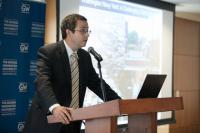-
U.K. could lose access to terrorism, crime databases if it leaves the EU: Europol

Rob Wainwright, the director of the EU’s police agency Europol, said that if Britain left the EU, it could lose access to important databases of terror and criminal suspects needed to fight ISIS. Wainwright said databases provided “daily” benefit to UK police in protecting borders. Leaving the EU would put intelligence cooperation in danger, he said.
-
-
Danish government considering plans to strip radical imams of citizenship
Denmark’s government is considering a proposal by an anti-immigration party to strip imams who preach ideas contrary to the Danish constitution of their citizenship. The proposal is part of an effort to expel outspoken radical imam Abu Bilal Ismail. Ismail is a leading imam at the Grimhoj mosque in the city of Aarhus, has openly called for the killing of Jews, and also the stoning of adulterous women and the killing of apostates.
-
-
The bitter fruits of alienation: Belgium’s struggle is the problem of our age
It is tempting to see the current waves of terrorism as the result of the sudden invasion of militant Islam. But in many respects the origins of the current violence remain just as local as the previous manifestations of terrorism in Western Europe – for example, the IRA or ETA. The sources of the current terrorist violence lie in the willingness of young men of immigrant populations to turn the quasi-criminal expertise learned in their formerly marginal lives to more political and violent ends. The problems that we confront today are not going to go away soon. The current terrorism is so amorphous and so shallow in its political affiliations that it may fade away, as those drawn towards it today are attracted to the more immediate opportunities of tomorrow. But it is more likely that the breaking up, arrest, and imprisonment of particular networks of individuals will simply be replaced by other such groups, who will similarly find in particular languages of Islam the vehicle for their angers and their emotional rejection of wider society. Putting back together Europe’s social contract might take longer than any of us would like to think.
-
-
Religious and civic rights were important components of a “Muslim nation”
Prophet Muhammad believed that freedom of religion and civic rights were important components of a “Muslim nation,” according to an analysis of the prophet’s covenants with Christians. The researcher argues that the covenants can be used to develop a stronger democratic partnership between Muslims and Christians in the Islamic world and elsewhere.
-
-
Massive U.S. attack in Yemen kills “dozens” of AQAP terrorists

A massive U.S. airstrike on a terrorist training camp in Yemen has killed dozens of terrorists belonging to al-Qaida in the Arabian Peninsula (AQAP). This is the second such attack in as many weeks. Military analysts note that the two strikes, in which more than 200 terrorists have been killed, signal a different, if unstated, approach by the Pentagon. Until recently, U.S. strikes on terrorist facilities killed relatively few terrorists.
-
-
Islamist militants planning “near-term attacks throughout Europe”: U.S.
The State Department has issued a warning to Americans planning travel to Europe, saying that Islamist terror groups are planning more attacks throughout the continent. In a warning unusual in its scale, the State Department said people should exercise vigilance when in public places or when using mass transportation.
-
-
Brussels attacks: a throwback to pre-9/11 terrorism
The terrible scenes in Brussels following a terrorist attack now claimed by Islamic State are a reminder of just how vulnerable airports can be. The most likely and realistic response is increasing security presence around airports with a greater number of random checks. There is no foolproof solution to this security issue, though, and that’s something governments are going to have to admit. Terrorists have the ability radically to disrupt transportation systems, potentially causing loss of life and economic damage in the process, and there is little that can be done to stop them. For some time, terrorists pursued the much more difficult task of attacking aircraft while largely ignoring easier targets. The attack in Brussels shows the reality of renewed efforts against “soft targets” with the potential to bring about chaos to transportation systems.
-
-
Brussels attacks: how radicalization happens and who is at risk

As they recover from the shock of the attacks in Brussels, people are asking why this happens, and who the people carrying out these suicide missions are. That such attacks could be launched from inside a European country once again calls attention to a serious crisis: the radicalization of citizens outside the Middle East by extremist groups. Can we expect ever more people around the world to be radicalized to join ISIS? The outlook is mixed. Despite the successes of its recruitment and radicalization campaign since 2011, recent media reports show that IS is struggling to integrate different groups of foreign fighters into its combat forces in the Middle East and North Africa, raising the prospect that competing loyalties could fracture the group and undermine its ability to project an appealing recruitment message. As far as the fight against IS recruitment goes, this is a ray of hope. But there’s plenty of bad news too.
-
-
Ted Cruz: Cancelled NYPD’s Muslim surveillance program could prevent terrorist attacks
Presidential candidate Ted Cruz criticized New York Mayor Bill de Blasio for shutting down the NYPD’s Muslim surveillance program. In the wake of the Brussels terrorist attacks, Cruz. suggested that to prevent such attacks in the United States, the police should patrol Muslim communities more heavily – and offered the NYPD program as an example of how such surveillance should be done. In 2014, the New York Police Department acknowledged that its surveillance program did not lead to any terror investigations. Police were not able to find a single lead.
-
-
More Americans in the last 25 years killed by far-right extremists than by Islamist terrorists
Over the last twenty-five years in the United States, those inspired by al-Qaeda and its associated movement (AQAM) have killed nearly seven-and-a-half times more people than far-right extremists have killed in one-fifth as many incidents. However, if you remove two outlier events — the 9/11 terrorist attacks and the Oklahoma City Bombing — far-right extremists (FRE) have killed nearly four times as many people as AQAM extremists.
-
-
34 killed, 151 injured in Brussels terrorist attacks
Three explosions — two of them suicide bombing attacks — earlier this morning (Tuesday), two at the international airport and a third in a subway station downtown, left at least thirty-four people dead and injured 151. Nineteen people were killed at the airport and fifteen in the subway bombing. Another explosive device was found at the airport and removed before it could go off. Brussels has been placed under a lock down, with all flights in and out of the city cancelled, and all train and bus stations hut down.
-
-
Hezbollah threatens it will attack Israel’s nuclear facilities in future war
Hassan Nasrallah, Hezbollah leader, on Monday threatened that in the event of another war between Hezbollah and Israel, his Iran-supported Shi’ia Lebanese militia will strike all targets in the Jewish state “without any limits.” He added: “If the Israeli army escalates its aggression against Lebanon, Hezbollah will strike all the strategic targets in the occupied Palestinian territories, including the nuclear facilities.”
-
-
John Kerry to meet leaders of Colombia’s FARC guerillas in Cuba today
Secretary of State John Kerry will meet today (Monday) in Havana with the leaders of the Colombian Marxist guerrilla group Revolutionary Armed Forces of Colombia (FARC). FARC has been fighting successive Colombian governments since the early 1960s, and is in control of an area the size of Switzerland in the mountainous jungles of central Colombia. In 1997 FARC has been designated a terrorist group by the State Department. Since last fall, the Colombian government and FARC, with the support of the UN, have been negotiating a peace pact.
-
-
U.S. Marines deployed to Iraq to join ground fight against ISIS
U.S. Marines have been dispatched to Iraq to join the ground fight against ISIS. The Marines are from the 26th Marine Expeditionary Unit (MEU), an air-ground fighting force of 2,200 soldiers. The number of Marines sent to Iraq has not been made public. Military analysts note that even though details about the role of the Marines in Iraq have not been made public, their deployment is a step toward the use of more conventional tactics in the fight against ISIS.
-
-
Turkish official fired after tweeting she hoped Israelis injured in Istanbul terror attack “were dead”
A Turkish official has been sacked over a tweet in which she expressed her wish that a dozen Israeli tourists wounded in a bomb attack in Istanbul “were dead.” The suicide attack by what the Turkish government described as a follower of ISIS, killed five people, including the bomber, three Israelis, and an Iranian, and injured thirty-six, of which eleven were Israeli nationals.
-
More headlines
The long view
Preventing Another 'Jan. 6' Starts by Changing How Elections Are Certified, Experts Say
By Sara Savat
The 2024 presidential election may be a rematch between President Joe Biden and former President Donald Trump, but preventing a repeat of Jan. 6, 2021 — when false claims of a stolen election promoted by Donald Trump and his allies led to an insurrection at the U.S. Capitol —will be top of mind this election year. Research finds broad support among public for nonpartisan certification commissions.
States Rush to Combat AI Threat to Elections
By Zachary Roth
This year’s presidential election will be the first since generative AI became widely available. That’s raising fears that millions of voters could be deceived by a barrage of political deepfakes. Congress has done little to address the issue, but states are moving aggressively to respond — though questions remain about how effective any new measures to combat AI-created disinformation will be.
Chinese Government Hackers Targeted Critics of China, U.S. Businesses and Politicians
An indictment was unsealed Monday charging seven nationals of the People’s Republic of China (PRC) with conspiracy to commit computer intrusions and conspiracy to commit wire fraud for their involvement in a PRC-based hacking group that spent approximately 14 years targeting U.S. and foreign critics, businesses, and political officials in furtherance of the PRC’s economic espionage and foreign intelligence objectives.
European Arms Imports Nearly Double, U.S. and French Exports Rise, and Russian Exports Fall Sharply
States in Europe almost doubled their imports of major arms (+94 per cent) between 2014–18 and 2019–23. The United States increased its arms exports by 17 per cent between 2014–18 and 2019–23, while Russia’s arms exports halved. Russia was for the first time the third largest arms exporter, falling just behind France.
LNG Exports Have Had No Impact on Domestic Energy Costs: Analysis
U.S. liquified natural gas (LNG) exports have not had any sustained and significant direct impact on U.S. natural gas prices and have, in fact, spurred production and productivity gains, which contribute to downward pressure on domestic prices.
Don’t Buy Moscow’s Shameless Campaign Tying Biden to Its Terrorist Attack
Russia has offered many different explanations to the ISIS-K’s 22 March 2024 terrorist attack at the Crocus City Hall in Moscow, but the most recent explanation offered by Russia is the most audacious yet: Russia now charges that the Ukrainian energy company Burisma financed the attack. Burisma is at the center of an effort by a congressional committee to impeach President Biden, but the case has all but collapsed. Hunter Stoll writes that Russia’s disinformation and propaganda apparatus appears to be searching for ways to keep Burisma in the news ahead of the U.S. presidential election.
